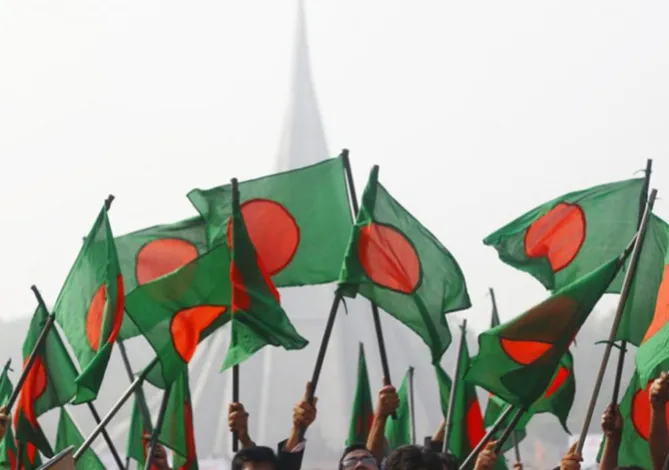
The election in Bangladesh is over. Prime Minister Sheikh Hasina has won her fifth term as the head of government, with her party, the Awami League securing an overwhelming number of 223 seats or three-quarters of the seats in the Jatiya Sangsad. As this commences her fourth consecutive tenure, after successive electoral victories in 2008, 2014, and 2018, continuity in Bangladesh’s politics and foreign policy can be expected. Dhaka is largely reliant on foreign investments and developmental cooperation for its infrastructural growth, which makes it the largest recipient of net Official Development Assistance (ODA) among all South Asian countries. However, it is unlikely that the dynamics that have shaped the current election will not leave an imprint on the country’s bilateral ties, which in effect will also find a reflection in its developmental scenario.
Bangladesh and its strategic partnerships
Located at the peak of the Bay of Bengal and close to the confluence of the Indian and Pacific Oceans, Bangladesh is geostrategically an important country in the Indo-Pacific. Its position allows it to oversee crucial shipping lanes, by which oil imports are ferried from the Gulf countries to East Asia via the Bay of Bengal and the Andaman Sea. In a future riddled with energy insecurity, Bangladesh is, therefore, a coveted partner for many major powers seeking an uninterrupted fuel supply to cater to their rising economies and high-density population counts. Dhaka’s untapped hydrocarbon reserves in the Bay of Bengal add to its merit as a prospective ally in energy cooperation. In recent years, Bangladesh’s political stability, rapidly growing economy, inexpensive labour cost, dearth of stringent environmental controls, and a government keen on promoting developmental partnerships have further amplified its lure as an attractive investment destination.
Located at the peak of the Bay of Bengal and close to the confluence of the Indian and Pacific Oceans, Bangladesh is geostrategically an important country in the Indo-Pacific.
Among the major powers in the Indo-Pacific, the United States (US), China, India, and Japan are the largest contributors to Bangladesh’s economy across all sectors of its foreign earnings including trade, foreign direct investments, and foreign aid for development. Interestingly, according to Forbes, these four countries are among the world’s top five economies in terms of their GDP in 2024. For China, Bangladesh is a crucial foothold in the Bay of Bengal region and a critical node in its flagship Belt and Road Initiative. With ties with India dwindling, Sri Lanka remaining wrapped in a debt crisis, and Myanmar facing political instability, Bangladesh is China’s best option to break out of its ‘East Asia mould’ and strengthen its maritime presence in the Indian Ocean. Beyond that, Bangladesh, like most of South Asia is also a ready market for Chinese goods and China is its largest trading partner.
For the US, once again Dhaka is a means to consolidate its position in this region amidst the geopolitical churn triggered by China’s rise. It is also one of Washington D.C.’s key partners in its fight against terrorism. For Bangladesh, the US is its third largest trading partner, the largest export destination for Ready Made Garments—its primary export product, and, Dhaka is also the largest recipient of USAID in South Asia. Bangladesh represents a potential connectivity node to Japan by which it can establish connectivity with the neighbouring countries of South and Southeast Asia and gain access to their markets. Conversely, Japan is Bangladesh’s largest source of ODA.
Australia is also trying to strengthen its partnership with Bangladesh via developmental assistance, as it considers maintaining peace and stability in the northeast Indian Ocean to be of national interest.
Unlike these countries, which treat Bangladesh as a strategic ally, for India, Dhaka is a ‘natural partner’ carved as it is out of its eastern territory. Geographically, it is well situated to provide a maritime gateway to India’s landlocked Northeast and propagate its ‘Act East’ and ‘Neighbourhood First’ Policies. For Bangladesh, India is its third largest trading partner, and a vital transit territory, for its connectivity with Nepal and Bhutan. Gradually, Australia is also trying to strengthen its partnership with Bangladesh via developmental assistance, as it considers maintaining peace and stability in the northeast Indian Ocean to be of national interest. Given this dependence between the major powers and Bangladesh, there is a need for thriving bilateral relations, especially for Dhaka as challenges are surfacing in its economy, threatening a downslide.
Push to take political sides vs diplomacy of balance
Consequently, while these powers have tried to influence Dhaka into taking political sides, principally the US and China given their mutual competition, Bangladesh has cultivated a diplomacy of balance in its interactions with these countries. The Indo-Pacific Outlook released in April 2023, beyond being a testament to Dhaka’s economic commitment and political non-alignment, is a manifestation of this diplomatic attitude. Whilst the Outlook has similar terminologies and priorities as the US’s Indo-Pacific Strategy, it is also careful not to offend Beijing in any manner as the latter considers the Indo-Pacific to be an American ploy to contain its influence. However, due to resemblances with the US’s Indo-Pacific Strategy, the release of the Outlook has frequently been construed as Dhaka's strategic manoeuvre to placate the US amidst concerns about Dhaka's increasing alignment with Beijing. This includes Dhaka's reluctance to endorse the US’s Indo-Pacific Strategy or participate in initiatives like the Indo-Pacific Economic Forum or the Quad (Beijing perceives it to be an anti-China grouping of the US, India, Japan, and Australia), despite receiving invitations from the US to join.
The US imposed sanctions over allegations of human rights abuse on seven former and current high-level officials of Bangladesh’s Rapid Action Battalion.
Owing to its apprehensions, in the last few years, the US has indeed attempted to interfere in Dhaka’s domestic politics, to exert more influence over the Bangladesh government. In 2021, the US imposed sanctions over allegations of human rights abuse on seven former and current high-level officials of Bangladesh’s Rapid Action Battalion. The American Ambassador to Bangladesh, Peter Haas, also met with the families of the victims of alleged abductions, including the family of Sajedul Islam Sumon—a leader of the Bangladesh Nationalist Party, the main Opposition party in Bangladesh. The Biden administration also refrained from inviting Bangladesh to its Democracy Summits and in the latest move before the 12th general election, decreed a restriction on the issuance of US visas to Bangladeshi individuals who it suspected of undermining democratic polls. Despite initial compliances, Hasina soon chastised the US for its handling of democracy and human rights. As a result, there is a palpable friction in current US-Bangladesh relations. It is to be noted that China, soon after providing vaccines to Bangladesh during the second wave of the pandemic, had taken the opportunity to warn the country against joining the Quad. However, following Dhaka’s firm response asserting its sovereignty, Beijing fell back on reassuring PM Hasina that she could rely on China to withstand US pressures and enhance economic ties with the country.
Assessing post-election challenges in foreign policy
Realising the need for stability in Bangladesh, which the Hasina government has been successful in bringing to Bangladesh in the past 15 years, the other major powers were keen on her return to power. Unlike the US, they thus maintained that Bangladesh’s election is its internal matter. India also went as far as requesting the US to not put too much pressure on the Hasina government, as it would encourage fundamentalist elements in the society to surface, thereby threatening regional stability. Australia remained non-committal on the issue. Post-election, therefore relations with these countries will prosper. The “Golden Chapter” in India-Bangladesh relations will receive a boost with more intensive cooperation in existing areas and expanding collaboration in new avenues. Ties with Japan will also span across new dimensions and India’s Northeast will be a major zone of cooperation between Bangladesh, Japan, and India. Linkages with Australia will also strengthen. However, the same cannot be assumed about Bangladesh-US relations. After the election results were announced, the US issued a statement that the Dhaka polls had not been free or fair and expressed its concern over reported electoral irregularities.
India also went as far as requesting the US to not put too much pressure on the Hasina government, as it would encourage fundamentalist elements in the society to surface, thereby threatening regional stability.
While it remains to be seen how the Hasina government will react to this comment, the US’s posture will likely push Dhaka to lean more closely toward Beijing. However, an increased Chinese presence in the neighbourhood will also be a cause of discomfort for India. It is thus possible that in the coming years, Dhaka’s diplomacy of balance will be increasingly occupied with maintaining an equilibrium between its engagements with China and India. However, while Dhaka is likely to increase engagements with China, especially if there is a dearth of US assistance, the Hasina government is well aware of global concerns over countries heavily in debt to Beijing. Thus, it will be careful in its collaborations, simultaneously advancing cooperation with Japan and Australia, as alternative developmental partners, to prevent its sole reliance on China and also to retain its political non-alignment. Ties with the US will also heal for mutual interests, but it will require certain reconciliatory efforts from Washington D.C. Even then, this will be a gradual process, as at present it is unlikely that either President Biden or PM Hasina, with a fresh landslide victory in her repertoire, will be swayed from their political positions. In all probability, PM Hasina will also reassure Bangladesh’s other strategic partners, international institutions, and even her populace of the credibility of her electoral win, to prevent the US narrative from gaining further ground, especially via her Opposition.
Sohini Bose is an Associate Fellow at Observer Research Foundation
The views expressed above belong to the author(s). ORF research and analyses now available on Telegram! Click here to access our curated content — blogs, longforms and interviews.




 PREV
PREV


